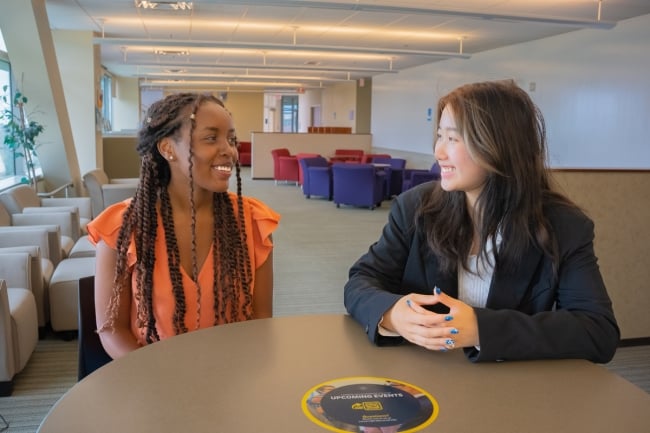You have /5 articles left.
Sign up for a free account or log in.

The Business and Economics Mentoring Program at the University of California, San Diego contributes to student success for lower-level students. Grace Njuguna (right) was a first-year student in the program and is pictured above with her mentor, Andrea Lai (left), a third-year Business Economics student.
Joel Ackerman
The University of California, San Diego launched a Business and Economics Mentoring Program in fall 2022 to support students from underrepresented populations, including low-income students and first-generation students. The program provides academic support, one-on-one encouragement, social activities, networking and research opportunities.
“The idea was to fill a comprehensive preparation program for these students from diverse backgrounds to support them in business-related majors,” explains Gregory Figueroa, program manager of the Business and Economics Mentoring Program.
What’s the need: In 2021, UCSD launched a bachelor’s in science in business economics and officials wanted to diversify the student population enrolled in business and economics programs.
UCSD enrolls around 520 economics majors annually and they’re primarily men, according to data from the Department of Education. The business school is also 49 percent male and 57 percent international students.
A gift from Karen and Jeff Silberman established the Belonging Initiative, which kickstarted and helps fund the mentoring program and additional services for four years.
“This program and initiative are designed to help matriculate economically challenged and first-generation students who enroll in these business-related majors,” Figueroa says. “But what it really does [is] help create access for all students to break down specific barriers that students from these varying backgrounds may face in pursuit of STEM-based degrees.”
How it works: Program staff partner with the admissions office to identify students who are interested in studying business or economics and recruit them for the program. Interested students complete an application, and then staff select the best candidates for the program.
The ideal mentee is a student studying a business-related major who is excited about the program, has leadership potential and demonstrates creativity or innovative thinking, Figueroa says.
“The goal for the Belonging Initiative [is] to open doors, and make students feel welcome in the university setting—keeping in mind that a lot of them are first-generation college students,” says Figueroa. “It’s also heavily centered around helping them excel academically, professionally, and begin helping them build that professional social network.”
The 20-strong mentee pool was divided between three undergraduate mentors, who were responsible for one-on-one outreach to establish the mentee’s math placement level and next steps.
“The course requirements are one of the main potential barriers that we aim to address from a logistical standpoint,” Figueroa says. “Particularly in math, because math is either one of those things that typically students fall behind or [do] not want to major in.”
Mentors act as guides for the entire student experience, supplying resources and hosting social and networking events to build community and relationships. Some events are exclusive to mentees, but others are open to all students interested in business-related majors.
As a result of their participation, mentors have grown in confidence, demonstrated clarity in presenting ideas and have continued to impact the program’s future growth, guiding and training the next cohort of mentors, Figueroa says.
The impact: Figueroa is collecting data on student engagement to measure the efficacy of the program by tracking how many students are consistent with their mentor or attending events.
Staff also heavily seek student input and interests to dictate the program offerings, Figueroa says, including programming, communication methods and internship or research opportunities.
“Hopefully, in the near future, we could analyze what’s been working as an agent and make some adjustments and hopefully get it to the point where we could present to other universities and help them replicate some of the work that we’re doing here,” he says.
Scaling up: For fall 2023, the program will admit around 30 mentees.
“This first year allowed us to understand that we could grow,” Figueroa says.
Figueroa is also expanding corporate partnerships to provide funding for the Belonging Initiative and provide internship opportunities for mentees as they progress through their college career. Many students have expressed interest in the fin-tech world, so Figueroa strives to establish relationships with groups who can provide that experience for mentees.
In the future, UCSD officials hope to strengthen the pre-college pipeline with local high schools, particularly those who serve Indigenous or tribal students, creating engagement with the Belonging Initiative from an earlier stage.
Students who graduate from the mentoring program are eligible for a graduate fellowship at the Rady School of Management, supporting their long-term goals and the university’s inclusive mission.
“The beauty of that is the same students, more than likely, will remain in San Diego and help contribute to the economy here, as innovators and as leaders,” Figueroa says. “It helps the up-and-coming generation of first-gen leaders create further opportunities.”
Get more content like this directly to your inbox every weekday morning. Subscribe here.




